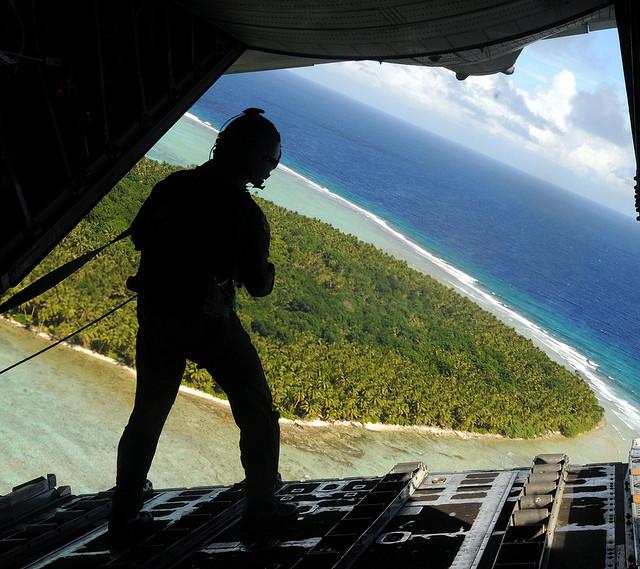The rising strategic stocks of Micronesia
Posted By Anthony Bergin on January 30, 2015 @ 12:30
 [1]Strategists have long focused on twin arcs drawn from Kyushu through Okinawa to Taiwan and then back through the Philippines to Indonesia. Much of the maritime space inside those ‘shallow arcs’, also known as the First Island Chain, is contested, not least by China.
[1]Strategists have long focused on twin arcs drawn from Kyushu through Okinawa to Taiwan and then back through the Philippines to Indonesia. Much of the maritime space inside those ‘shallow arcs’, also known as the First Island Chain, is contested, not least by China.
But in a piece published in the AFR today [2] I’ve suggested we consider another arc: from Tokyo to the US-held Northern Marianas and Guam, and on to Yap, Palau and Indonesia. Behind this ‘deep arc’ lie the Caroline and Marshall islands, forming independent republics.
This ‘Second Island Chain’ surrounding China is the Micronesian region. It’s of great strategic importance to the US, which is in the midst of a military build-up on Guam. And it has been used in the past as an invasion route to PNG and Australia. It’s an important strategic axis where the interests of China, Japan, Taiwan and the US, as well as several Southeast Asian countries, intersect.
Japan has a strong interest in the three former US trust territories—the Federated States of Micronesia (FSM), the Republic of the Marshall Islands (RMI) and the Republic of Palau—and maintains diplomatic missions in each, as well as consulates in Guam and Saipan in the Northern Mariana Islands.
The region is rising in political prominence: RMI hosted the Pacific Islands Forum in 2013, Palau last year and FSM will do so next year.
Under the terms of ‘Compacts of Free Association’ with Palau, FSM and RMI, the United States has defence responsibilities for each. The US military’s Kwajalein Base is used as a test site for ballistic missiles launched from the US, and for other missile and space-related activities, on a long-term lease arrangement with the RMI.
The centrepiece of US-led North Pacific security is Guam, a US territory further from Honolulu than Honolulu is from Los Angeles. It’s an island with a thriving tourism industry alongside its military bases. Preparations continue for the future strengthening of the US military presence [3] on Guam. A US–Japan joint statement in 2012 specified that out of about 9,000 Marines to be relocated from Okinawa, about 5,000 Marines would move to Guam, a move that will start in the early 2020s.
Our diplomatic footprint in the region is tiny. Our Pohnpei Ambassador has multiple accreditations: to the FSM, the RMI and Palau, and (as Consul-General) to Guam and the Commonwealth of the Northern Mariana Islands. We’ve got no Defence adviser based in Micronesia (although there are several naval surveillance advisers linked to Australian-donated Pacific patrol boats).
We need some harder thinking about our strategic interest in the North Pacific, including possible plans we might put in place in preparation for the marines basing in Guam. While we currently contribute to regional security through annual participation in Exercise Cope North [4], we could consider Australian defence representation on Guam and training with the US there and other areas of Micronesia.
We like to say we’re a big player in the Pacific and if that’s so, then why aren’t we thinking about a bigger role in the North Pacific?
Anthony Bergin [5] is deputy director of ASPI. Image courtesy of Flickr user US Pacific Command [6].
Article printed from The Strategist: https://aspistrategist.ru
URL to article: /the-rising-strategic-stocks-of-micronesia/
URLs in this post:
[1] Image: https://aspistrategist.ru/wp-content/uploads/2015/01/4191084229_66b3094f34_z.jpg
[2] piece published in the AFR today: https://www.aspistrategist.ru/publications/opinion-pieces/dont-ignore-micronesia/Dont-ignore-Micronesia.pdf
[3] future strengthening of the US military presence: https://www.fas.org/sgp/crs/row/RS22570.pdf
[4] Exercise Cope North: http://www.defence.gov.au/exercises/copenorthguam/
[5] Anthony Bergin: https://www.aspistrategist.ru/about-aspi/aspi-staff/executive/anthony-bergin
[6] US Pacific Command: https://www.flickr.com/photos/us-pacific-command/4191084229
Click here to print.